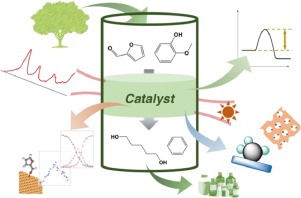当前位置:
X-MOL 学术
›
Prog. Energy Combust. Sci.
›
论文详情
Our official English website, www.x-mol.net, welcomes your feedback! (Note: you will need to create a separate account there.)
Foundational techniques for catalyst design in the upgrading of biomass-derived multifunctional molecules
Progress in Energy and Combustion Science ( IF 29.5 ) Pub Date : 2018-07-01 , DOI: 10.1016/j.pecs.2018.01.003 Brian M. Murphy , Bingjun Xu
Progress in Energy and Combustion Science ( IF 29.5 ) Pub Date : 2018-07-01 , DOI: 10.1016/j.pecs.2018.01.003 Brian M. Murphy , Bingjun Xu

|
Abstract The production of fuels and chemicals from renewable lignocellulosic biomass resources has been a major research focus in the last few decades. The most efficient method for synthesizing value-added chemical products from sustainable feedstocks is direct catalytic conversion, however, the multifunctional and highly oxygenated biomass-derived substrates are significantly different from petroleum-based feedstocks. Thus, systematic development of new catalytic materials is required to take advantage of the only substantial source of renewable carbon. In this review, we discuss the foundational methodologies that enable rational catalyst design through the investigation of surface-adsorbate interactions and the elucidation of descriptors for selectivity control. Molecular spectroscopies, efficient and predictive computational modeling, rigorous kinetic investigations, and highly controlled materials synthesis have generated fundamental insights leading to general catalyst design principles in biomass upgrading processes. The application of each technique in biomass research is discussed in the context of several case studies, with a focus on the unique insights available from each technique. Moreover, the interplay among multiple techniques, particularly between experimental and computational methods, is also highlighted. Despite the impressive progress made in the biomass field, major roadblocks still exist due to the complexity in the composition and structure of both substrates and catalysts. We share our perspectives regarding future needs in selective catalytic conversions of multifunctional substrates and methods for accelerating catalyst development.
中文翻译:

生物质衍生多功能分子升级中催化剂设计的基础技术
摘要 从可再生木质纤维素生物质资源生产燃料和化学品一直是过去几十年的主要研究重点。从可持续原料合成高附加值化工产品的最有效方法是直接催化转化,然而,多功能和高度氧化的生物质衍生底物与石油基原料显着不同。因此,需要系统地开发新的催化材料,以利用可再生碳的唯一重要来源。在这篇综述中,我们讨论了通过研究表面-吸附质相互作用和阐明选择性控制的描述符来实现合理催化剂设计的基本方法。分子光谱学,高效和预测性的计算建模,严格的动力学研究和高度受控的材料合成产生了基本的见解,导致生物质升级过程中的通用催化剂设计原则。在几个案例研究的背景下讨论了每种技术在生物质研究中的应用,重点是每种技术的独特见解。此外,还强调了多种技术之间的相互作用,特别是实验和计算方法之间的相互作用。尽管在生物质领域取得了令人瞩目的进展,但由于底物和催化剂的组成和结构的复杂性,主要障碍仍然存在。我们分享了我们对多功能底物选择性催化转化的未来需求和加速催化剂开发方法的看法。
更新日期:2018-07-01
中文翻译:

生物质衍生多功能分子升级中催化剂设计的基础技术
摘要 从可再生木质纤维素生物质资源生产燃料和化学品一直是过去几十年的主要研究重点。从可持续原料合成高附加值化工产品的最有效方法是直接催化转化,然而,多功能和高度氧化的生物质衍生底物与石油基原料显着不同。因此,需要系统地开发新的催化材料,以利用可再生碳的唯一重要来源。在这篇综述中,我们讨论了通过研究表面-吸附质相互作用和阐明选择性控制的描述符来实现合理催化剂设计的基本方法。分子光谱学,高效和预测性的计算建模,严格的动力学研究和高度受控的材料合成产生了基本的见解,导致生物质升级过程中的通用催化剂设计原则。在几个案例研究的背景下讨论了每种技术在生物质研究中的应用,重点是每种技术的独特见解。此外,还强调了多种技术之间的相互作用,特别是实验和计算方法之间的相互作用。尽管在生物质领域取得了令人瞩目的进展,但由于底物和催化剂的组成和结构的复杂性,主要障碍仍然存在。我们分享了我们对多功能底物选择性催化转化的未来需求和加速催化剂开发方法的看法。


























 京公网安备 11010802027423号
京公网安备 11010802027423号